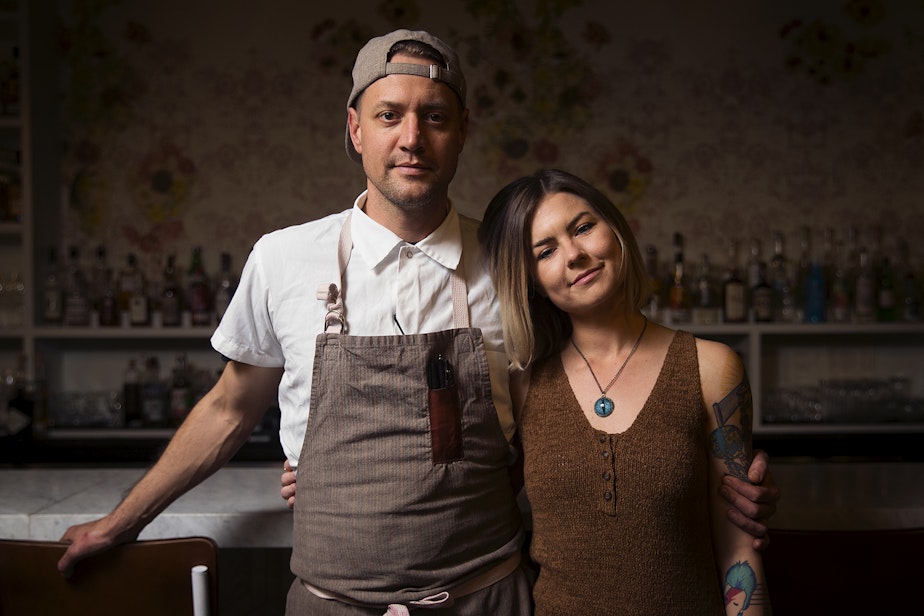Ben’s Friends: Staying sober in an industry surrounded by booze

A meeting has just ended at the restaurant Eight Row in Seattle’s Green Lake neighborhood.
But counter to the tradition common at many restaurants and bars -- having a drink with industry colleagues -- there are no shots and no beers being passed around as people linger, chat, and clean up.
Eight Row is closed on Mondays, but in the morning, people from all parts of the restaurant business come in. Over coffee and snacks they share stories of personal victories, anxieties, and their struggles with addiction. This is Ben’s Friends, a support group specifically for the industry.
For people working in the food and hospitality business, staying sober can be especially tough. The industry has one of the highest rates of substance abuse, according to the National Survey on Drug Use and Health.
“I was a very high functioning alcoholic,” said David Nichols, chef and owner of Eight Row. “I could go out to the wee hours of the morning and drink and drug and then come back the next morning and still function at a very high level and do my job and do it very well.”
He might’ve convinced himself he was fine, but there was one moment he’ll never forget. He was working in New York as an executive chef. One night he was at a fundraising event with his employer. He kept sneaking out for shots and shots of vodka.
“Coming back to the table they were doing an auction and I kept raising my hand for the $20,000, $30,000 auction thing … Marc (the employer) made me leave and I will never forget that moment, just making a fool of myself.”
Sponsored
The next day, his employer pulled him aside.
“He was like, ‘Dude, you’ve got a problem,’” Nichols said, noting he was stunned. “I think that was one of the first times that someone told me I had a problem, and I was like, crap. Maybe I do.”
Nichols says he’s tried to quit drinking on his own. He’s been in rehab. But it’s a struggle to stay sober. He had heard about Ben’s Friends. He thought it would provide another layer of support for himself and others like him in the industry.
So when he moved back to Washington state and opened his restaurant, he and Eight Row manager Kate Willman started a chapter in Seattle.
Ben's Friends
Sponsored
Willman has been sober since 2013. She says while Ben’s Friends is modeled after AA meetings, one big difference is there is no anonymity.
“We cannot be anonymous anymore,” Willman said. “Because there’s so many people like Ben who, you know, suffer alone.”
Ben’s Friends started in South Carolina, in honor of Ben Murray, a chef who died by suicide. No one knew about Murray’s struggles with depression and alcoholism until his death.
“Addiction really thrives in isolation,” Willman said.
To date, there are 10 chapters across the country.
Sponsored
There are other factors that make it hard to stay sober. The reality is, alcohol is a big part of the restaurant business.
“We have a big wine program here and the staff is expected to know about all of those wines," Willman said. "And how do you learn about wines? You taste them.”
Alcohol is also built into the restaurant culture. At the end of a long shift, it’s not uncommon for staff to break out the beer while cleaning or to go out for drinks.
Dara Solliday is a visual artist and has been a bartender for almost 20 years. She’s tried to take breaks from drinking before, but last year she decided to quit for good. She gave notice at the bar where she worked. She decided to limit her bartending to catering events and was looking at the want ads for work.
“Even the want ads will say like, 'Free shift drink as part of the free shift meals,' 'free shift drinks.' So it is built into the system as a reward," Solliday said.
Sponsored
Solliday says that through Ben’s Friends she sees her own struggles reflected in other people who come to the meetings.
For David Nichols, sharing in group helps create a new industry culture. It's a sense of togetherness he says, without the booze and drugs. Nichols says since the chapter started in November, it helps him stay accountable.
“It was a struggle for many, many years to talk about it,” he said. “But the more I talk about it, the more I’m open to talking with my colleagues, or friends and family about it. And the easier it is for me to get through every single day.”




